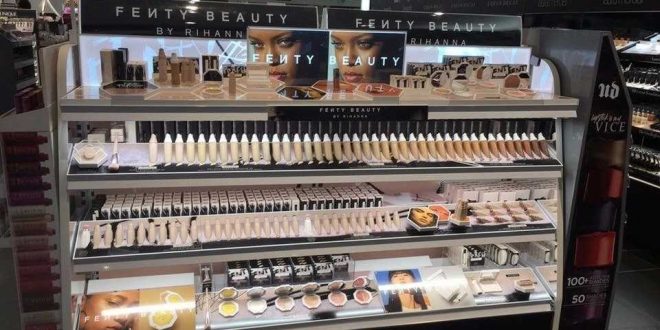As a member of the Rihanna Navy, I was ecstatic about the release of Fenty Beauty by Rihanna during New York Fashion Week. The makeup collection launched at Sephora with 40 foundation shades, a bold move for a new makeup brand.
“Fenty Beauty was created for everyone: for women of all shades, personalities, attitudes, cultures and races,” Rihanna said on Fenty Beauty’s website. “I wanted everyone to feel included.”
According to many makeup lovers and YouTube makeup artists, the line has accomplished that feat. Makeup is something that has existed for thousands of years and until this day, many women of darker complexions, along with paler complexions, feel a lack of representation in makeup campaigns and products that appeal to their skin tones.
In an article titled, “How the Beauty Industry Has Failed Black Women” on Refinery29, it explains how black women attribute “80 percent more on cosmetics and twice as much on skin care as their non-black counterparts.” They also pointed out that black women spend an estimated $7.5 billion on beauty products each year.
One of the first brands that attempted to satisfy the needs of more shade representation was L’Oréal with the launch of their “Women of Color Lab,” which is geared towards developing darker shades for women of color. Also, Lancôme has been the leading foundation brand for women color with 20 shades less than the new Fenty Beauty collection.
Skin tones and complexions are complicated things to replicate. People may be considered in the same complexion, but their tones range based off of undertones. With limited shades, many makeup lovers complain about either looking “ashy” or orange. If makeup companies invested in creating more shades, this could fix this issue.
One of the possible reasons why Fenty Beauty is being received positively is because of the frustration people face when trying to find products that fit them. Representation in the beauty industry has been a big issue for a long time. In the last decade, we’ve seen a wider acceptance when it comes to natural hair.
Many hair companies who used to promote strictly straight hair textures have shifted their focus onto curlier and wavy textures. With more people opting not to chemically straighten their hair, it makes perfect sense on why this would be a smart business move for hair product companies. Hair companies projected that the “natural hair movement” would die, but it has actually changed the face of the hair industry.
Perhaps more makeup brands should follow suit and opt to give more than three or four options for consumers with darker or paler skin complexions. Makeup companies should take notes on the success of Rihanna’s Fenty Beauty launch and aim to be more inclusive.
Story and photo by Cynthia Papailler.
For more opinion stories, look here.
 The Spectator The independent student newspaper of Valdosta State University
The Spectator The independent student newspaper of Valdosta State University








That’s really a great blog and very useful for women out there. Who want to know more about makeup.keep sharing these information.